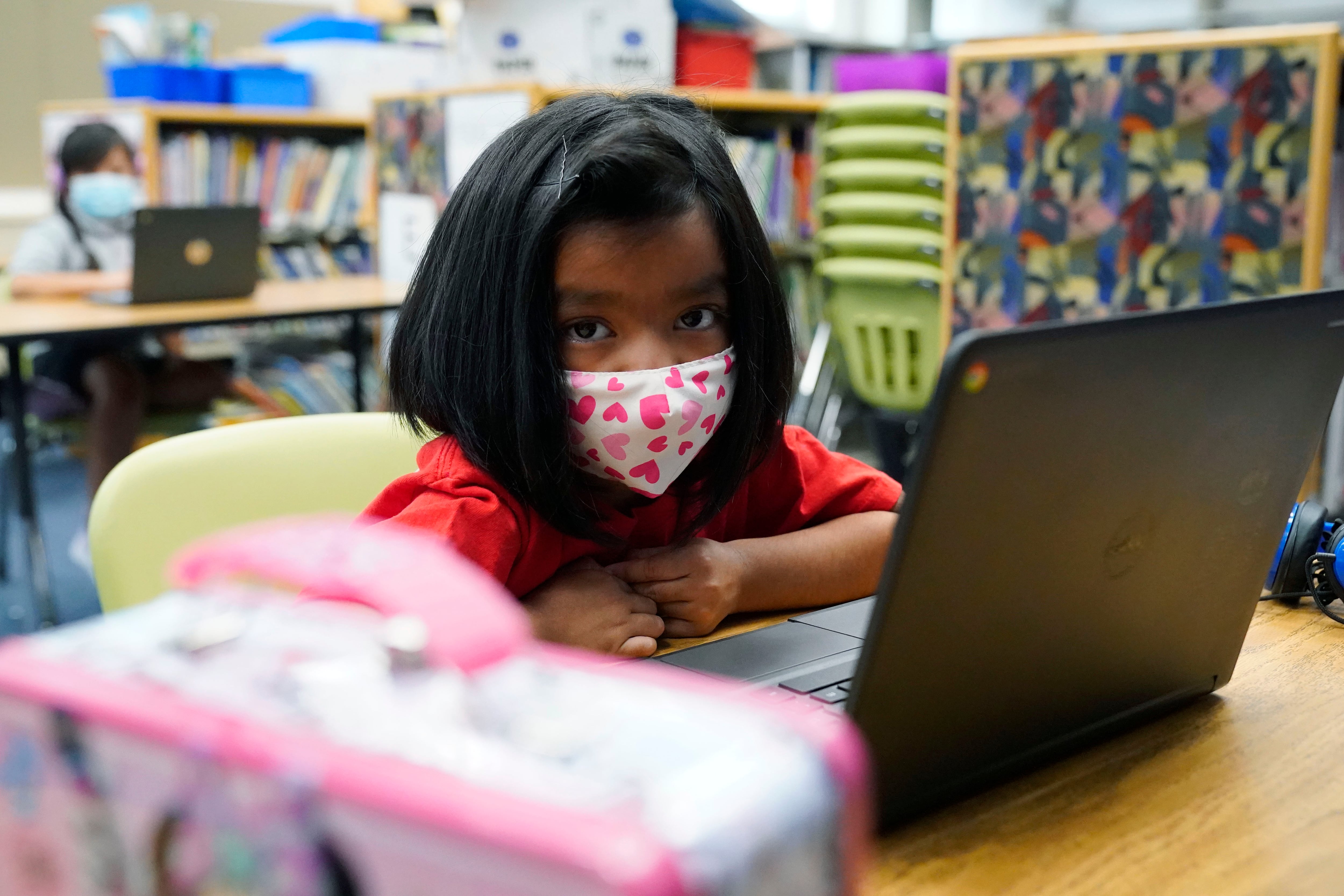Denver elementary school students headed back to classrooms Monday amid a monthslong debate: While some teachers protest the return to in-person learning as too risky during the pandemic, some parents cheer the move as crucial for their children’s academic and social well-being. The school district insists that in-person learning is relatively safe.
“We understand that there are those concerns out there,” Interim Superintendent Dwight Jones said, “but we also clearly understand that we have to get our kids back in school. It makes a difference. They are safer in school. And they want to reconnect with their teachers.”
Given a choice between returning to classrooms or continuing to learn virtually, most students’ families chose in-person learning. The percentage varied by race and neighborhood. The latest Denver Public Schools data shows that 42% of families in far northeast Denver chose virtual learning, compared with 27% of families in less diverse southeast Denver. About 40% of Black and Hispanic students chose virtual learning, compared with 20% of white students.
For months, some parents have publicly pleaded with the Denver school board to reopen schools while teachers asked for the opposite, sometimes tearfully. Last week, educators held a drive-through vigil outside district headquarters to illustrate the “human stakes” of reopening.
“I want to be in the classroom with my 4-year-olds, but not at the expense of my life or theirs,” Kathryn Quinn, a preschool teacher at DCIS Fairmont, told the school board last month.
At the same meeting, parent Sumeet Garg, who identified himself as a pediatric surgeon at Children’s Hospital Colorado, argued that teachers are essential workers, in-person learning is safe, and keeping students at home is stunting their academic and social growth.
“Not feeling safe at school does not equal not actually being safe at school,” he said.
Denver schools are joining others around the state in reopening classrooms this month after shuttering them in late November, when COVID cases were spiking across Colorado. Amid new restrictions, case numbers decreased statewide in December but have ticked back up again recently. Some districts are waiting to see if the holidays cause another spike.
Suburban Jeffco Public Schools is bringing elementary students back Jan. 19, after the Martin Luther King Jr. Day holiday. But the district is waiting to reopen secondary schools, which officials say they will only do if conditions remain favorable.
The Adams 14 school district in Commerce City also planned to bring students back starting on Jan. 19. But last Friday, the district delayed that until Jan. 25, citing “current case rates and patterns.” Incidence rates in the Adams 14 school boundaries remain higher than in surrounding districts. Based on TriCounty Health Department data Monday, the two-week incidence rate within Adams 14 neighborhoods was about 820 cases per 100,000 people.
Superintendents have said it is hard to maintain enough staffing to keep schools open when case rates are above between 500 and 700 cases per 100,000 people in a two-week period.
The two-week incidence rate in Denver was about 480 cases per 100,000 people on Monday, according to Denver Public Health. In suburban Westminster Public Schools, it was about 740 cases per 100,000, TriCounty Health Department data showed.
But Westminster is proceeding with in-person learning, and at a faster clip than most districts. Instead of phasing its reopening, Westminster Public Schools reopened school buildings to all students Monday. The majority of students — 71% — have chosen to learn in person.
Denver Public Schools won’t bring secondary students back until Jan. 19, and their return will be phased. The district’s plans call for all students to be back in classrooms by Feb. 1.
If all students return, it will be the first time in 10 and a half months that Denver middle and high school students attend in-person classes.
District officials have highlighted several new measures they say will help keep schools as safe as possible and open for as long as possible. They include:
- Free COVID testing for Denver Public Schools students. The district partnered with an initiative called COVIDCheck Colorado that has provided free testing to teachers since August.
- Free rapid at-home COVID testing for teachers and staff. The governor’s office recently pledged to provide as many as 1 million rapid BINAXNow tests per month to districts.
- One free KN95 mask per educator per week, or, if educators prefer, free surgical masks. The governor’s office has been providing schools with KN95 masks since the fall and will continue. Teachers wearing KN95 masks may not need to quarantine after being exposed to COVID.
- Shorter quarantine periods. In line with new federal guidance, officials said the district is working to finalize guidelines that will shorten the period of time a person has to quarantine after exposure from 14 days to 10 days or even seven days with a negative COVID test.
Interim Superintendent Jones said the district will continue to consult with local public health officials on whether it’s safe for students to return. For now, he said, the answer is yes.
“It is time for students to be in school and for us to get back to providing the very best education that we can with in-person learning,” Jones said.
Chalkbeat reporter Yesenia Robles contributed to this story.





